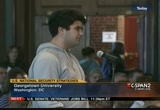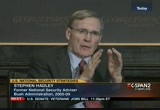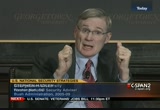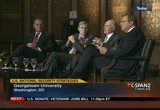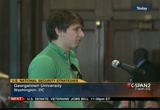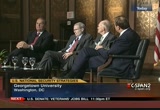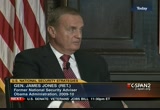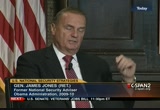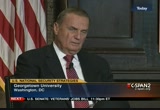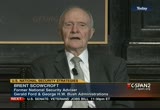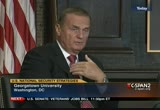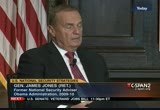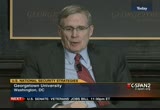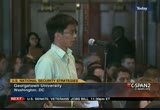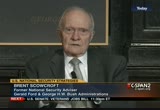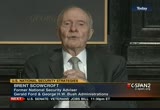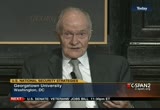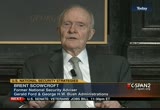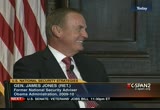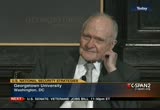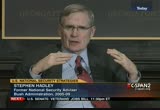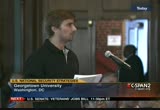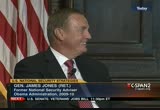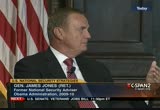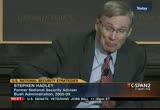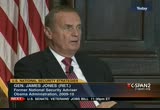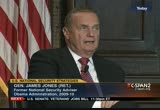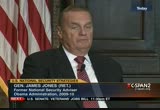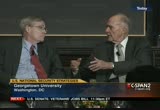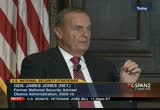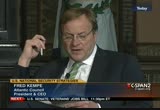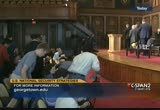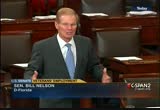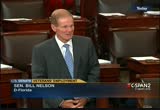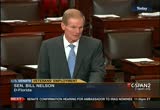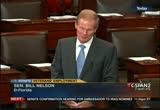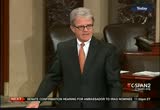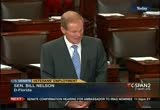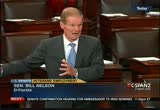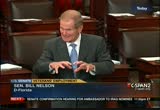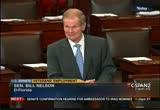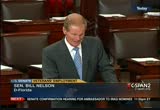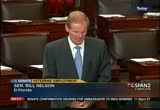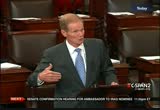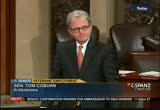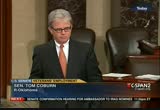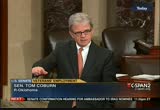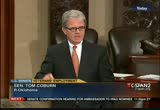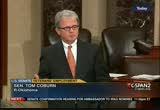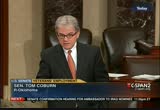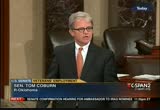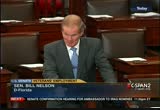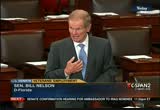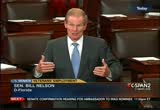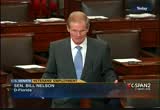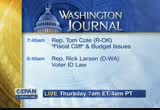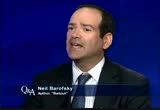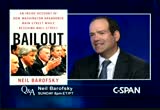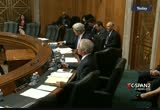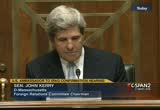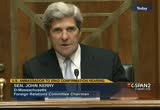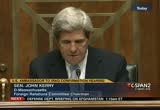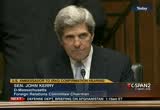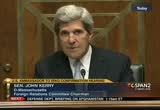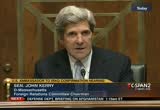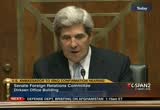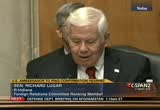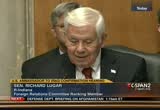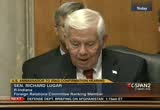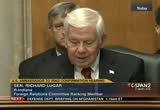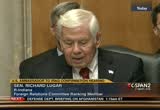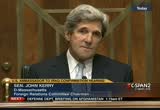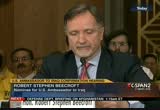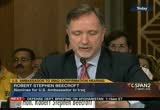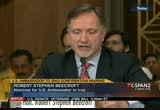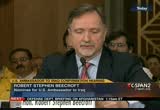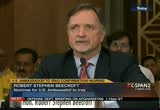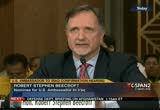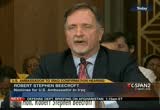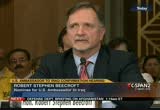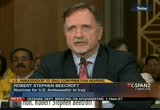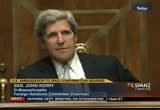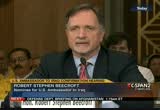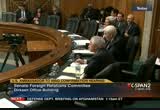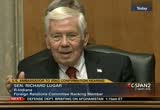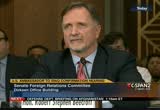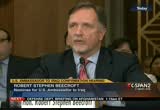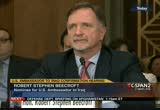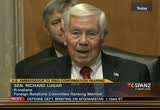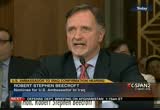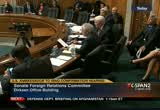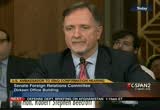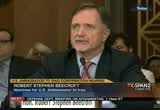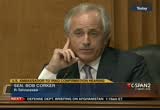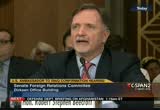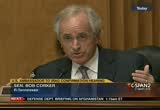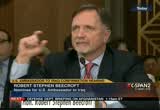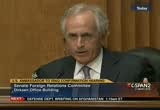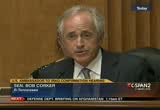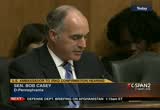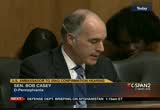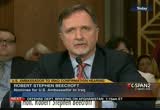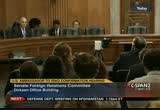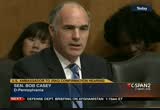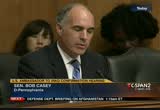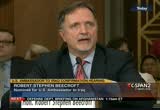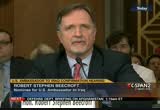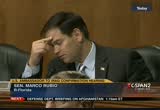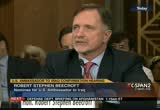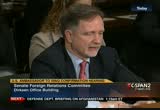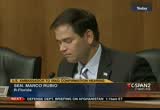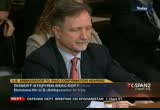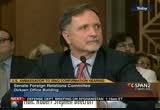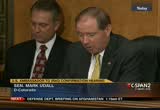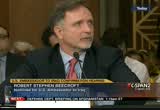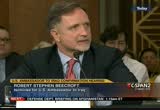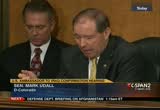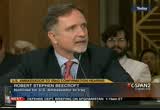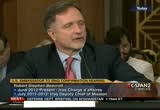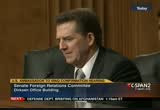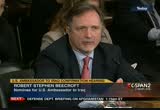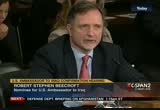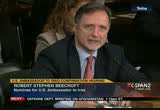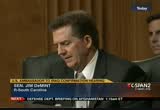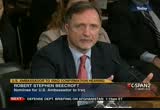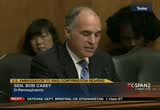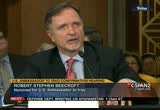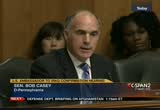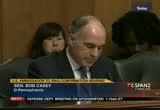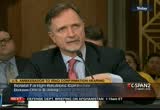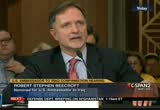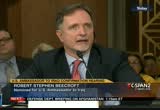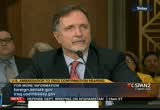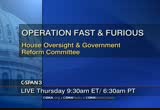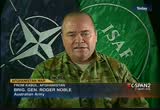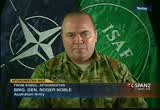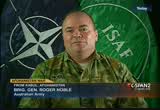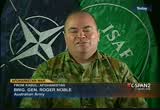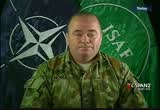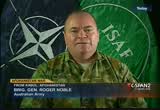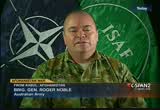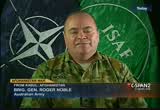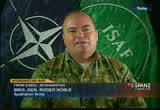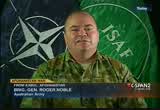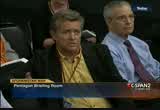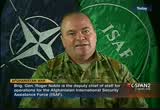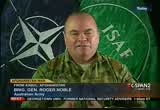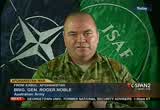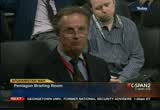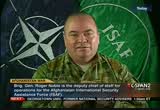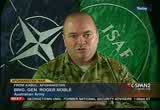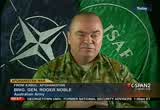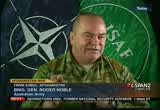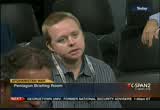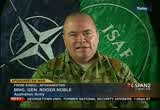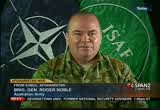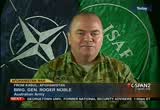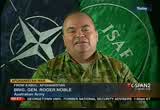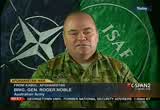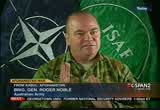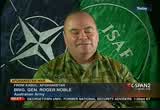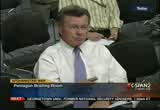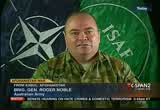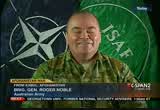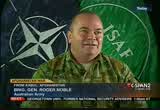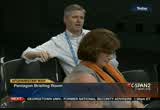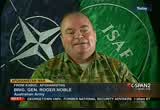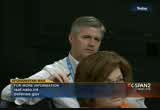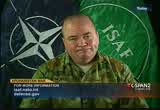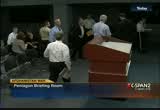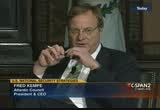tv Capital News Today CSPAN September 19, 2012 11:00pm-2:00am EDT
11:00 pm
implied the u.s. needs to be the leader of the world for some reason. if you look around today in the world, you find number of countries who are not only unwilling to follow us but actively opposed to our leadership. what point do you reassess our point in the world and check our greemly interventionist approach to the world and focus on the problem that are pressing here at home? >> well, have all said need to fix the problems here at both both because we need to fix the problems here at home to have a more process pows society. they are a foundation for the role in the world. i think there's no conflict, and i would say to a new president, you know, you have a priority -- your priority is your top domestic priority and your top national security priority is the same thing. fix the economy, get our economy growing and deal with the debt
11:01 pm
and the deficit. as he was saying, there is reallocation in the world in terms of power and influence, the results from the 2008 financial crisis it is beginning to be reflected in global constitutions, it should, the g120, which includes additional countries that like india and brazil and others replacing the g7 and the g8, that's all to the good. but, you know, president bush used to sometimes say to me, well, you know, this is a problem. we have a lot of problems, why don't we give it to the u.n.en or give it to nato. and it made me uncomfortable. i used to say, plpt, these constitutions are terrific constitutions they have capability and their form of brings the nations of the world together to solve the problem. but all of these constitutions need to be animated by the energy and leadership of their
11:02 pm
individual country members, an [inaudible] that tends to be the united states and a few others. so yes, there's has been some reor yenation. there's the strengthening of international substitutes. yes, country like china, india, brazil need to be gavin given a larger role. they are nottism executing. they need leadership from within. and brent's point is there are not a lot of countries who are capable or trusted to provide that leadership. and that's why [inaudible] there is a defusion of power in the world even though that's going change how the united states leads in the world, i think brent is right. and i think general jones would agree, we need to get our house in order for domestic purposes but also so we can help provide leadership for the international community in dealing with the problems. >> i think -- [inaudible] the attitude is understandable.
11:03 pm
the world doesn't appreciate it. to hell with them. let's take care of ourselves. we're not talking about leadership in the world as an awe truistic thing. school of foreign service it's a fallup question to that. america has created an international system that is more beneficial to limited democracy and free enterprise than in the world. and it's done so through leadership in a wide variety of spectrums. and it will don't do so in the
11:04 pm
coming decades. however, it seems inevitable for a lot of reasons that americas' dominoes and therefore -- you ask military dominance will not continue in the same way. it won't be able to afford to two major military operations at the same time. the question is, does america's global leadership depend on global military. >> let me start with general here. let me add to that question. i just returned from the gulf, and saw the remarkable airbase, you know, where the american powers is powerful there. you talk to the gulf officials, look we know in times of war you're going to be there and we have the security guarantee. right now in the arab awakening. we need you engaged neferred a much different way. we don't think you are. in the sense so you to be. so you pick up the question.
11:05 pm
11:06 pm
an the question comes around to the united states have done so much. to make the world what it is. but we don't see you anymore. we see chinese companies coming in and actually don't have much competition buying the natural resources giving. contracts and so on and so forth. where is america? that both earths me a little bit. if that's the case, i think in some ports of the world, it is. we're not competing. we're not competing with that stuff. and i think that's part of the reshaping of our response package where you can in fact respond with public sector -- the private sector involvement. you can respond to it with the ngo and the pentagon what you're trying to do your strategy can be shaped appropriately. you should be able to call on the things an harmonize them.
11:07 pm
where the government and the private sectors are one. the decisions they make are rapid as opposed to us. we need fix the things that we need fix, we need to change some laws and reform our export control reforms. we need to -- [inaudible] enable the americans giant to be that giant again. but it's going to be completely different than i think having the world's most [inaudible] by the factor of 2012. if they're not going to be as instrumental. new world order. i think that's the case.
11:08 pm
i'm the program here. and i teach at the navel academy. my question is for general jones hearing from both sides of the tribe. [laughter] in a role of national security advisers what were your relationships with senior uniform military leadership. do you think that were collaborative or cooperative. were they dependent on the roles or it was on personality and personal relationships that you built? when i became national security advisers, i retired from the military. partly a matter of principle
11:09 pm
partly a matter of u.s. law at this time. [laughter] i like to think that was there was a little comfort on the part of the military in the pentd gone that might not have been there had i not had a military background. but i don't know, i never asked that, i never sought support for the military outside of my world. it's hard for me to answer that question and it is a question, i think that is asked more by people outside than by people inside. i don't know. do so you anything different? i thought it was in your terms of your ability to understand
11:10 pm
and world and our military culture think about it is. in my own dellings i e dealt with the secretary of defense the civilian leader in the defense department. and not directly with the former colleagues. that's the way our system works. now the secretary gates normally when e he came to the white house he brought the chairman -- and that was his call. there was no didn't have to do that. that's what he did. that and had meetings with the president once a week. the chairman of the joint with the secretary of defense. when i pick up the telephone to call the pentagon, i did call up former colleague it often would be in a important position to get a military viewpoint, i got everything i needed from
11:11 pm
secretary defense and secretary of state and civilian officials. so you can't spent 0 years in uniform and not be colored by your experience and know something about it. i general factored it in. it helped me understand things. i didn't carve out a special relationship with the military. from your perspective -- [inaudible] >> and that is to say i dealt with the secretary of defense, if he told me i should deal directly with the chairman i would, but i would never do it without having done so. i also made it a practice, i never called out to the field to combatant commanders. that was reaching in to the chain of command. and the national security adviser and the chain of -- it's the secretary of defense and
11:12 pm
down. i think that's right. military experience helps you understand what you're -- hearing but, you know, the pattern of the interaction are pretty well established and consistent with the notion of being in the control of the military that makes it different than pakistan. it's a strength of our system. >> thank you for the question. >> good evening. i'm [inaudible] a or soft i want to shift the region of focus to asia. i was wondering the issues of the right now concerning china and the neighbors are seen as the issue of the rising power and challenging existing power and challenging the united states. is -- how are we in looking at the situation in that kind of framework or is there any other realistic way we can tackle the issue we're facing in the west pacific in a different framework without looking at china as
11:13 pm
absolutely the agree owe political adversary. is there a realistic way to do it. >> maybe you can pick it up first. at the same time deal with south china's issues/pivot to asia in the context as well. >> i think our relationship with china needs to be looked at in the light of the new world not the century world. this is -- i don't think this is a zerosome game between us and the chinese. they are a rising power, of course, they're getting stronger, they had enormous economic success, they also have enormous political problems. economic problems, all kinds of problems. but as you look at the issues around the world, the general issues, that preoccupy us, we
11:14 pm
the chinese are not fundamentally -- on any of them. so i think this is a relationship where we didn't use to see the chinese anywhere when nixon went china in 1972, we had no contact with them except hostile and korea and the offshore islands. we had no contact with them at all. that developed only gradually and now we run in the all kinds different areas. and we have very different ideas. we have different histories, different culture, different methods of thinking so we're different people. but i don't see theer reconcile ability we tend look at the
11:15 pm
rising powers like germany the late 19th century or japan before world war or two. two. i don't think we ought to look tat in that way. the south china sea thing is a very interesting and complicated issue. it came up a couple of years ago and it's not clear exactly who brought it up. but we did or whether the chinese did. but the issue did relates to a line that the chinese century agos drew in the area as being the chinese border. and modern law as to how you differentiate territory and sovereign territory as your exclusive economic zone. and other kinds of things. it's a very complicated issue. and we -- we are not taking a
11:16 pm
position on what we're saying is it needs to be worked out by the parties. woal, the chinese wanted to work it bilateral because they're the big guy and the others are the individual little guys. but this is a part of a -- if you will a min between the chinese growing in self-confident and wanting to assert themselves in the sovereignty farther and farther from share shores and us existing on the freedom of the sea and rites of passage, and so i think it is not a fundamental issue. it could become a very vexatious issue if it's not carefully handled. i believe we can handle it
11:17 pm
carefully, and we will handle it carefully. of course, it will be help of the if the u.s. senate would ratify the law of the sea convention because we have no standing right now. >> i completely agree with that. but when i heard the term [inaudible] because the words are important, and the people who privated toward interpret it one way, and people you're privating away from because that's what privating plays interpreted so if you're an african leader, for example, or european or south america w, you're saying to a globally globally -- says something like that that causes all kinds of think tank business. and what does it mean?
11:18 pm
they like those. it keeps them employed. [inaudible] [laughter] you know, a unilateral ram pivot was . >> it does carry is rebalance, and, you know, but really the pivot sound better. [laughter] you know. but it is important. words are important and we should choose them carefully and sometimes actions should speak louder than words. >> i also want to say as a former basketball players, general jones nows about pivots. [laughter] be >> i know a lot about bench time too. [laughter] [laughter] the chiensz last year asked me to explain what private means in english.
11:19 pm
[laughter] >> please. >> thank you for joining us today. my name is [inaudible] i'm a senior in the college here at georgetown. this question was relevant two years back with the ground burning organized by pastor jerry jones in florida and the affect. so in light of the killing of the ambassador christopher stevens. is there a point that as a national security adviser you would advise a curtailing or tempering of certain formeds of our freedom of expression in order to protect the lives of americans abroad? >> do it very briefly. i staid not as a constitutional lawyer not as an expert on freedom of speech. common sense wides wise we used to say freedom of speech does not allow you to yell fired in a crowded theater. i think the kind of think we saw
11:20 pm
last week is exactly that. one of the things we have to find out and figure out as a country particularly in the context of the new media is how do we draw that line between protected speech and speech that really is is going to put innocent lives at risk. there is a line there. and we have a challenge to figure out how to draw that. >> i think we have time for maybe two more questions. thank you very being here today. it's a privilege to hear you. i'm a first year in the southwest graduate program. touched on the general feet i want to take it in more specific destruction. general jones, you talk about the need to adjust the new model. given the challenging balance of power relationships particularly in places like east asia.
11:21 pm
how sustainable do you think our current -- mutual defense treaties or in light of the challenges relationships? and if they're not stabble and need to be adjusted can we do so in pragmatic way without letting our allies people like we are abandoning them? >> thank you. >> why don't i pick up the last question. i think what's interesting that one of the realities what's going on in asia right now are countries like the fill philippines who asked us to leave not too long ago or now -- almost the entire filipino government came to washington recently to ask us to come back. south vietnam, or vietnam, but vietnam north and south. i'm sorry. i'm dating myself a little bit
11:22 pm
here. [laughter] i'm a pretty good date too. [laughter] but former adversary. ask us to consider more engage ment taiwan, obviously, has been a bet of mine. you're seeing a pivot announcement. you're seeing some reactions on the playing field that would tell your question would tend to lead me to conclude -- give them more meaning. you know, but i agree with my -- all three of us agree on the
11:23 pm
same thing. the likelihood of a major conflict with china and any other country probably is pretty slim. the likelihood of brush fire challenges have to be responded to and more presence is actually important. being there, and it works both ways. i think that we're in to a period much more negotiations maybe some in asia in particular talked about some occasional spikes to make sure that -- those were just brush fires and not forest fires. >> i met with quasi government official. i knead a passion plea that the existing military alliance had been a force of stability in the region and it facilitated the peaceful rise in china. i was very eloquent. at the end he said, mr. hadly.
11:24 pm
you're right. i'm confidence that was not the reporting cable back to to bay jinx. there were adjustment in the relationship. i think they continue to be an element of stability in asia. . [inaudible] hi i'm james martial. i have aquestion for general jones regarding iran. do you believe that the obama administration should set clear red lines regarding the nuclear program, if so, what you think the red lines should be? [laughter] >> i would believe if you go back and look at the president's prenounsment on the issue, back even in 2009, you can see he was very clear in terms of the national purpose and the national goal.
11:25 pm
to my knowledge, that hasn't changed. but and i think our policy is informed by pretty good intelligence, and that it's quite possible that the sanctions -- first of all, i think the sanctions are in fact i think they cause the regime to come back to the iea, notice a country like turkey, for example, and originally in 2010 really was championing the right-hand side position is now seen little bit [inaudible] i think you have to be careful how you articulate where your red lines are. there's no question in my mind what our policy is. and there's no question in my
11:26 pm
mind that a nuclear weapons capable the iran is a clear danger to the neighbors they said so. it's a country that would probably trigger a nuclear arms race in the middle east. and that's a country that would clearly probably export that technology to the first time demonstrate -- in my view, nonweapons of mass destruction changes the world that you and i live in. so i'm comfortable with what i hear from our government, i think we are -- we have worked on this. i know, it for a fact firsthand and i think steve did as well. we very, very seriously with the our friend and allies, we gave it a good shot in 2009 to let iran declare itself and to show
11:27 pm
i.t. to the reasonable. they haven't shown that, and but i do think that goat any kind of . >> draw the redline? >> no. i agree completely with jim's approach. >> i'm pessimistic. i think we should play out our options. i'm pessimistic. i worry about this time next year we'll be out of options. and that will require the president to make tough decisions. >> i think that -- i think it may be the case, but, you know, we have changed the world issue of iranian missile from -- iranian nuclear weapons to anybody else who has gotten
11:28 pm
nuclear weapons. we didn't have the argument when islam got the weapons or pakistan got the weapons. we had a big problem with india, it was so -- it was separate. we newed to be careful how we proceed here. >> if i could come back to i think what is a central point here, and that is that the middle east is still -- by the middle east problem, i mean, the israel palestinian question. still the big rock that has never been moved, and the fallout from any successful -- any hint of progress in solving this problem, the ripple effect, effect everything else going on in the world. and so i think that the danger of the prime minister's position in israel is that he is thinking
11:29 pm
-- all left the government and are openly critical of the prime minister's position striking iran you can be stampeded that would have no basis in fact but a political forcing function. would cause a cataclysmic region. >> [inaudible] >> yes, sir. >> i think that's a great line and we need to be thoughtful not in -- so with that, general
11:30 pm
jones has once said the 21st century is not a time to sit back and make a lot of decisions because of the amount of issues we face every day. it's a daunting proposition to think you can take the time to reflect. you have to. and so i think what we really allowed us to do with the three of you is reflect not only on the immediacy of the issues. the difficulty in solving them, but also the under lying requirement to come with up with a strategy in a way of thinking about this really remarkably changed world we live in. with that, the audience enjoyed you. thank you so much for this. [applause] [applause] ..
11:31 pm
we've got to crack down on china when they cheat. you manipulate their current fee. he still patterns and designs. this counterfeit goods and i know they want to be a responsible partner in the world of trade and commerce and they're going to have to understand they can't take away jobs in an unfair basis.
11:32 pm
11:33 pm
>> the senate today had a bill that would've created a $1 billion jobs program for veterans. they spend beyond the limits congress agreed to that here. the senate democrats choose those short to need to go forward.t here is 20 t minutes of senate debate on the bill.alking >> regardless of what she feel about a budget and budget point of order, we are talking a technicality to kill a bill to halt unemployed veterans at apey time that they desperately needb help because they are coming and back from iraq and afghanistan and they can't find work. and
11:34 pm
and so we come out of the recession and the recovery way a higher percent of unemployment and especially veterans under age 24 have an even higher percentage of unemployed, and so what we have here is a piece of legislation to give an unemployment cushion for veterans for at least a year until they can find employment in the private sector, and this is employment to do things that we need since so many of our national resources such as parks, such as emergency responders, such as firefighters, such as police need help. look at all the unfunded things
11:35 pm
that are deteriorating in the national parks. this would be an opportunity to employ those veterans and employ them up to a year. everybody knows that this makes common sense and it's the right thing to do, and what's happening is the folks on that side of the aisle because we are in an election and because this happened to be a proposal coming out of the white house and is brought to the floor by this senator from florida, they're not going to support it and they're going to kill it on a technicality by denying us 60 votes in order to waive the budgetary point of order. now, that's the bottom line, that's what's going on here, and it's sad and yet that's what's happening. just look at the votes in the last week. here we passed the motion for
11:36 pm
cloture on the motion to proceed by 95-1. doesn't that tell you something? and then we had the second procedural vote, it was 84-8. all we need is 60 votes to get over this hurdle and to get to the bill and then probably pass it by unanimous consent because everybody agrees with the substance of this. it's clear that commonsense legislation that has bipartisan support is getting thwarted in this chamber, and that's because we all know how important it is to help our veterans find work as they return home. now, does the senator from oklahoma want to ask a question? you know this senator from
11:37 pm
oklahoma knows my respect for him and my personal friendship for him, and i admire the senator in the courageous stance, but the senator would understand that i respectfully say that in a need so great as unemployed veterans, this is not the time to draw a technical line on a budget, and i would earnestly and respectfully request of my friend that this be one of the considerations that he would make. would the senator want to engage in any conversation, or i will go on and just -- mr. coburn: i would just like to ask the president of the senate if we could have a real back and forth debate on this, with you controlling the time. i have no difficulty with that.
11:38 pm
but one of the reasons i came out is i don't agree with the substance of this bill, and i don't want you to make a statement from the senate floor that everybody does. we have six veterans' job training programs that nobody has oversighted. nobody knows if they work. mr. nelson: what i would suggest to my friend -- and he knows that he is my friend -- if he has a difference of opinion, i respect that and i want him to share that. i'd like to go on and just complete my very brief statement here, and then for the senator to state whatever it is. the unemployment rate among veterans returning from iraq and afghanistan was hovering around 11%, and for those unemployed veterans in the age 24 and less, it's even higher. we have taken steps to combat
11:39 pm
this problem. this past summer, we passed legislation that will help veterans get federal occupational licenses when their military training matches civilian requirements. that made sense. that made common sense. as a matter of fact, we got that through the senate unanimously, and that was signed into law, and that was to say that a veteran gets all of this specialized training, and they ought to be able to utilize that training without having to go through all the training and the re kind of licensing. we could do that -- and we passed what is now law -- we could do that in federal law where there is a similar kind of requirement. now what's in this bill is to do that for the state occupational
11:40 pm
requirements, to take a veteran who has a military discipline, a specialty, and as that veteran is applying for a private sector job that happens to be covered by state law on the occupational requirements and requirements of licensing, that that is a consideration instead of the veteran having to go through all of that again. now, that just makes common sense, and that particular idea was offered by the senator from arkansas, senator pryor, and is a part of the bill, just like senator murray, she is here on the floor, the chairman of the committee, reached out and incorporated a number -- and she can address that -- a number of the different ideas bipartisan,
11:41 pm
not just my idea, which is the one that i was talking about that veterans can have employment up to a year, but so many others that are incorporated into the bill that came out of committee. and so we -- we already did something about matching civilian requirements, albeit what was signed into law was just with regard to federal employ. last year also, we passed a bill that granted tax benefits to companies that hire wounded warriors. and, of course, you know what inspiration that all the rest of us take from the wounded warriors. the senator and i from time to time go to bethesda to what used
11:42 pm
to be called bethesda naval, now is the combined all-military services walter reed. i just -- every one of us that goes out there and you suddenly see these veterans coming in on these new kind of computer controlled prosthesis where they can actually walk and run even when their leg has been blown off above the knee, it's -- it just pulls at your heart and yet you're so glad that technology has moved. but those same ladies and gentlemen need jobs, and until the recovery is complete, they're having difficulty. that's why i filed this bill. and the chairman of the committee and the ranking member have done their best to work across the aisle.
11:43 pm
veterans don't care to hear about why we can't help them. they don't care to hear about technicalities of a budget point of order. they want our country to support them in the way that they have supported us, and that is an obligation. a lot of us in this chamber have served in the military, and it's ingrained, i think, in every senator here that we have an obligation to those who have served this country. this effort here today that we're going to vote on in 20 minutes has the broad support from veterans and police organizations, the disabled american veterans, the military officers association of america, the national association of
11:44 pm
police organizations, the american legion. they all support it. the iraq and afghanistan veterans of america have called and pleaded for its immediate passage. and they know why. because their veterans need, and they need to know that congress has their back. so i just make a plea to the senate, we just need a few votes from that side of the aisle to get to the threshold of 60 to waive the technicality of the budget point of order. and, madam president, i would yield the floor and i would be looking forward to my friend's comments. mr. coburn: madam president? the presiding officer: the senator from oklahoma. mr. nelson: the time is controlled over here. i would reserve, madam
11:45 pm
president, the final seven minutes for the chairman of the committee. the presiding officer: without objection. mr. coburn: my colleague from florida raises some good points about our desire, about us wanting to help our veterans. i don't think there is anybody here that does not recognize the significant sacrifice. as a matter of fact, it wasn't long ago that the 45th from oklahoma lost 17 people in afghanistan and hundreds wounded. the real question is how do you help them the best? how do you really help veterans? you know, we're going to have plenty of opportunities to always say there's a reason to not do the right thing for the long-term best interests of our
11:46 pm
country. we have never found ourselves in the predicament that we find ourselves in today in terms of our financial exposure. the real risk to the veterans that have jobs today -- which nobody is talking about -- the real risk for them, because when this thing goes down -- and i'm talking about the financial collapse of this country. when it happens, those that have jobs that are veterans, they're going to lose them. so there could be a no more noble cause than to make an exception for veterans, except that's not what the senate does. we make an exception every time, every time. here's the question for my friend. under what system of values,
11:47 pm
honor and integrity did these veterans serve? the highest and noblest of honor and integrity. without a doubt. they put their life on the line so i don't have to, so my adult, mature children in their 30's and 40's don't have to. the difference is is what they put their life on the line for was to ensure that the freedom and liberty and vibrancy of this country goes forward. and we're taking a little pocketknife to one of the legs of the three-legged stool with our actions and slowly nibbling
11:48 pm
the support of that leg. we're taking it away by our very action. mr. nelson: madam president, i'd like to respond to my friend. mr. coburn: if i could finish? we're going to say that the financial condition of the country doesn't matter. we're going to say that it doesn't matter if the $1 billion we're spending a year are already on veterans job training programs. it doesn't matter. we're going to say here's a year's program of jobs for 20,000 veterans and it's going to trump everything else. you know, you wouldn't have any objection from this senator if you actually really paid for this, one; if you didn't violate
11:49 pm
paygo, and you really did it in a way that oversighted the president's job training programs that we had, and you really did it the way that matches the integrity and honor of our veterans. we didn't do that. now, we played games. we played games with the budget rules. we played games with paygo. we didn't do any oversight. we didn't even have a hearing. there was no hearing on this bill. you took senator burr's suggestions which were commonsense, and applied it broadly across the government. but we didn't match the honor and integrity and valor and purpose. and when i meet with veterans in town hall meetings, i ask them why they serve. you know what they tell me?
11:50 pm
because this is the greatest country the world has ever known, and they want to keep it that way. what we're doing today doesn't keep it that way. it doesn't keep it that way. it perpetuates the same problems that have created the very, very dangerous situation that this country's in. so when we make a claim that everybody agrees with this bill, i just want to say i don't agree with the bill. there's a whole lot of ways to help veterans that is better than that, that gives them a permanent job. we passed the g.i., the post-9/11 g.i. bill; right? you can get paid a stipend while you go to college to learn a new skill, the same as a noncom officer. you get paid for the books and tuition and everything else, so you can become whole as you learn a skill. we have the capability for studies while we're in the
11:51 pm
military. we have six separate job training programs that we're spending $1 billion a year on. the best way to help veterans is to fix this country's economic situation to create opportunity, and they'll fly, because they've already proven that they have the initiative, the strength, the moral courage, the integrity and the valor to accomplish anything that they want to accomplish. so i'm in disagreement with my friend. i think we have a political device in front of us, and i'm going to be very interested to see the character of the senate on whether it succumbs to the parochial and political over the best long-term interests of the country. and if it does, it just proves that the senate needs to be
11:52 pm
changed to truly address the real problems for the country. that's what it's going to prove, regardless of the outcome. do we have the character? do we match the valor, honor and integrity of the people who serve this nation in the armed forces with our willingness to sacrifice our political careers to do what's in the best long-term interest of the country? they set the example for us. the question is whether or not we'll follow their example. i yield to my friend the floor. mr. nelson: madam president? the presiding officer: the senator from florida. mr. nelson: madam president, before the time that is reserved for the chairman of the committee, i just want to respond to my friend -- and he is my friend -- from oklahoma by telling him why i think he's wrong on this issue and tell him by way of a compliment to him. because the senator from
11:53 pm
oklahoma and i, the senator from florida, had worked together -- he being much more prominent in the efforts to bring the budget under the control a year ago. in having discussions across the aisle, often private discussions, what started as a group known as the gang of six that grew, blossomed into what in effect became a group of 45. and i think that was the number of us that stood up in the senate press gallery in the summer a year ago -- it was the summer of 2011 -- and said that we want add big, $4 trillion-plus budget deficit. and we pointed out ways that we could get there. indeed, what this senator has
11:54 pm
said, i have heard other republican senators -- and i will name one -- who we feel almost and have said very close to identical things publicly. and that is senator lindsey graham. and he stated it on "meese -- "meet the press" a couple of months that the way you get there is reducing revenue through reform of the tax code, by going after all of the tax preferences which have ballooned out of control since the last tax reform bill in 1986 that this senator, then a young congressman, voted for, to the point that tax expenditures, tax preferences are now $14 trillion over ten years. a lot of them have outlived their usefulness. a lot of them, their special
11:55 pm
interests or sponsors would tell you we wouldn't want that if we can have a certainty of a lower rate. and, therefore, we have said many times on this floor and in public statements, you can take tax preferences, restrain them, use that revenue to do two things: lower everybody's tax rates, including corporate. streamline the tax code by getting all this underbrush of preferences out of the way. and then use the rest of the revenue to lower the deficit. now, i suspect that the senator and i feel very similar about that issue. and so when he talks about reforming the spending process, the fiscal process, which includes the revenue process of this country, then i think we
11:56 pm
have grounds for significant agreement. and i would hope that we're going to address that in the lame-duck session that starts. my plea today is that we don't take it out in this particular case on something that can be done immediately for veterans in need returning home from iraq and afghanistan. mr. coburn: would the senator yield for a question? mr. nelson: of course. mr. coburn: through the chair i'd ask the senator how did he vote on the tax extender package coming out of the senate finance committee? because that's the real test of whether or not you want to reform the tax code. if i recall, you voted for it if i recall, you voted for it
11:58 pm
to be these fears what starts looking out for fraud and abuse, the magic words written into the statute. what they're supposed to be doing has really become more often dislike any other governmental agency, their number one concern, things about their budget, how to preserve their budget. very worried about class and with management, worried about too much interaction with congress. it was very leave very much a goal on gets along type of key -- attitude. i kept hearing over and over again there were three different types, a lap dog who would presumably curl up on the lack of management. a watchdog which was in between, and a junkyard dog. and i think ultimately when i was going to the confirmation process and was told by senator raucous who was the head of the fire at -- finance committee which oversaw one of my confirmation hearings that i needed to be like a junkyard dog. >> neil barofsky work to uncover fraud and abuse in the
11:59 pm
$700 billion a t.a.r.p. bailout program. more from his book "bailout" sunday night at 8:00 on suspense q&a. >> and senate confirmation hearing, the nominee to be u.s. ambassador to iraq today expressed confidence in his ability to keep american diplomatic personnel safe in that country. anti-american protests continue in the arab capital. robert stephen beecroft has been working as a diplomat in iraq sense to a dozen 11 and currently heads the u.s. embassy in baghdad. this hearing of the senate foreign relations committee his an hour and 15 minutes. [background noises] >> thank you all. i apologize to everybody that we are running a little bit late, even though it does not appear
12:00 am
as though a lot is happening around here. there is a lot going on. i'm sorry for the process. i want to thank everybody for coming. i'm very, very pleased to welcome robert stephen beecroft, a career service officer and nominated by president obama to be our ambassador to iraq. i think all this on the committee you're pleased the president has nominated somebody of high caliber, great experience who has already been serving as the deputy chief of missions in baghdad for the past year and previously served as ambassador to jordan and executive assistants and secretaries of state : al and, police rice. while america's war has ended in a rock -- iraq, the struggle for the future obviously has not ended. the violence is down, but al
12:01 am
qaeda en iraq remains deadly and may not capture the day to day headlines, but no one should make the mistake that to somehow come to a conclusion that iraq does not present extraordinary challenges. this administration has worked tirelessly to assure that it does not become a forgotten front. through the strategic framework initiative agreement we have put in place a road map to expand our relations with iraq on the broad spectrum of issues, political, economic, cultural, educational, scientific, and military. our bilateral partnership has the potential to contribute, we believe to the stability in the middle east, but iraqi leaders have to decide for themselves what kind of country they hope to create. as they do, we need to develop that diplomatic energy and
12:02 am
civilian resources necessary to help them succeed. ambassador kamal of your skills, considerable skills are going to be called on in iraq and among the many challenges the you will face going forward that i would personally particularly like to just call your attention to. as we mourn the tragic death last week, deaths of ambassador chris stevens and his three colleagues in benghazi, we are reminded that our diplomats all around the world serve on the front lines of some of the world's most dangerous places, and they do so at great risk to themselves and at great personal sacrifice for their families. our embassy in baghdad, the consulate's and other offices supporting the embassy and offices of security cooperation still number about 14,000 people that makes it our largest mission in the world. we are going to need someone
12:03 am
with the demonstrated management skills to write size the mission and ensure that all the appropriate security measures are in place to keep our staff safe and secure. the leaders of iraq have are rare opportunity to consolidate their democracy in build a strong, durable institution or set of institutions that can hold the country together. more will be required from the iraqi government. questions remain about whether iraqi leaders, including the prime minister aspired to represent a unified iraq in all of its diversity. whether they seek to govern in nearly according to ethnic and sectarian constituencies come to ensure that parliamentary elections in 2014 are free and fair, the electoral commission of iraq must be professional, transparent, and impartial. iraqi leaders across the political spectrum must also be willing to make tough compromises and put national
12:04 am
priorities over personal ambition. it is no secret that we are at the moment of-sectarian tensions in the middle east. iraqi leaders should understand that the best way to insulate themselves from the horrific violence in syria is through a meaningful, political compromise in iraq. as the leaders of iraq work to establish a more stable political order they need to redouble efforts to reach agreements on disputed boundaries on oil and on the final status. if progress is not made in defusing tensions the window for a peaceful resolution of disputed territories may well close. baghdad must resolve differences on the kurdish recent -- regions authority to enter into aural exploration and contracts. to their credit the iraqis have made experts -- efforts to
12:05 am
resolve issues ready to -- related to revenue sharing, but the country's still backs an overarching legal framework for its oil industry. without this agreement iraq will be unable to unleash the full potential of its oil sector. for years iraq has focused on its internal politics, but it now must also begin to look outward. it is not surprising that iraq seeks neighborly relations with iran, but the reports of iran using iraqi airspace to resupply the ruthless regime are struggling -- troubling. just this week it was a knowledge that iran is providing assistance and training to groups inside syria, begging the question of how else iranian material might get into syria. this is a problem, and it will only grow worse if it is not addressed. the iraqi response to the situation and syria will also be
12:06 am
an important test case. the ball like the government should play a constructive role in supporting initiatives that bring about a peaceful transition in syria. at a minimum, it should avoid fanning the flames of violence. it will also be encompassing other countries in the region, particularly the gulf cooperation council to recognize iraq as something other than an iranian proxy and work more proactively to normalize relations. i continue to believe that iraq has an opportunity to chart its own course as an alternative to the iranian model and demonstrate the vibrant potential of a truly multi ethnic shiites majority democracy. let me just close by reiterating that our embassy in baghdad is one of our most important today, and what happens there is critical to our bilateral relationship, but also to all of our work in the middle east.
12:07 am
this is not the time to delay. there is no substitute for having a confirmed ambassador in place and ready to hit the ground running, especially at this critical moment in the region. it is my hope to move this nomination as rapidly as we can in the next 48 hours because we must have a confirmed ambassador, and it would be a dereliction of congress's response ability where we to leave here for the next six weeks and not have been so. as strongly support the ambassador's nomination and intend to work for that swift confirmation. ambassador kamal we welcome you today. thank you for coming on short notice. we appreciate it and look forward to hearing your thoughts on the way for. >> thank you very much, mr. chairman. today's hearing is our first since the attack in libya that claimed the lives of four americans, including ambassador chris stevens. the events in benghazi and
12:08 am
ongoing threats to our embassies remind us that with dangers and difficulties of performing diplomatic missions, it is almost impossible to be an effective american diplomat without exposing oneself to risk . in some countries risks can be intense, yet exceptional americans like ambassador stevens continue to volunteer for these assignments. we are grateful that you continue to volunteer, sir. his life and work resonate especially with our committee, not merely because he was a talented diplomat, but because he was one of us. on many occasions during his time in 2006 and it as a seven he sat directly behind where i am sitting now. hearings on lebanon, iraq, and other millie's topics. exactly six years ago today he helped staffing hearing.
12:09 am
after departing the kennedy he stayed in close touch with friends here, as he did at every stage in his career. we will miss our friend dearly. our thoughts gun to his family. although the debt that the ambassador's stevens and others in the state department and our country, we also underscore the importance of our diplomacy and the difference that an ambassador can make. all of us have read accounts of his extraordinary service. to be clear to everyone that he was personally instrumental in advancing the united states interests in libya. could embassadors at their posts providing energetic to their embassy teams. i appreciate ambassador courage and combat in taking on an extremely difficult assignment that has been complicated even further by violence in the least. he had been functioning as chief of missions for several months,
12:10 am
and i believe we should move to confirm him as our ambassador to iraq. his experience with managing large indices and especially given the u.s. mission in iraq as the biggest and the seal the world, the operation includes the huge embassy complex in baghdad, several allied facilities. about ten security cooperation police training sites and consulates. employees numbering approximately 1,600 u.s. direct tires, 240 iraqis, thousands of contractors. the divide that has been the source of great conflict. though it -- politically iraq remains fractured. those divisions appeared to have deepened in the last year. this stability depends upon its being integrated with responsible neighbors and the
12:11 am
world community. long term future depends on its willingness to stand on the side of human rights, democracy, and the rule of law. the political fragmentation and corruption also presents fundamental challenges to its economy. in annual world bank report analyzes the ease of doing business and the protection of property rights across 183 economists. brent iraq 164 in 2012, down five slots from its two dozen 11 ranking. despite prime minister of milwaukee's claim that iraq is open for business, most investors and trade partners are challenged to get a visa. our definitive answer from the government. according to the world bank last year implemented a policy that made it more difficult for iraqis themselves to do business
12:12 am
. the alley toward to hearing ambassadors in sites in the security situation as well as use of the prospects for economic improvement and political stability. beyond reports on the current status of iraq, the administration is to eliminate the united states intentions for the long term with some significant downsizing, the iraqi operations continue to be enormously expensive. how does the administration define u.s. goals? what are the prospects for achieving these goals? what resources would be required over the long term? i look forward to your testimony, and that they determined for this hearing. >> thank you very much, and thank you for your recollections . be appreciated very much. ambassador, you can tell, considerable interest in a really forward to your comments.
12:13 am
>> thank you, chairman. members of the committee. it is an honor to appear before you today as the president's nominee to serve as the united states ambassador to the republic of iraq. i'm grateful to the president and secretary taunton. i would like to submit my full statement for the record. >> without objection. >> thank you. i would like to begin by take a moment to acknowledge my colleagues to paris in benghazi. i spent most working on the middle east. for much of my career i have been immersed in issues from serving on the desk in washington d.c. the most recently serving as deputy chief in baghdad. the honor to work with nature nearly talented, hard-working, and collegial team, best in the
12:14 am
business. today the united states is engaging. the country is only now emerging from over 50 years of isolation, fragmentation, and war. we have a strong relation to the democratically elected government codified in u.s. strategic from murder remic the common roadmap for our bilateral commitments. through this agreement we support and assist in the rockies in building at democratic country that can play a constructive role in the region. of course challenges abound, and our work is not easy. sectarian frictions remain strong and threaten to derail negotiated accords and institutional progress. lack of hydrocarbon law fees the tension and unsettles the oil export sector. factional feuding has slowed the organization a provincial elections scheduled for early
12:15 am
2013. tensions with turkey, the conflict within syria, and the relationships of fan anxiety and complicate our relationship. nevertheless, developments that i have seen give me reasons for optimism. a large majority have remained committed to resolving their differences politically instead of through violence. the oil production recently passed the million barrels per day, a level it had not achieved for more than three decades. u.s. commercial interests are returning, and students are studying the united states in increasing numbers. these are signs of positive change. the united states retains a violent continuing role in support of the democratic process. if confirmed, and plans to continue working with our allies across the iraqi political spectrum to strength of democracy and democratic institutions. nelson plans to continue engaging with the government on a wide range of initiatives to expand economic growth,
12:16 am
strengthen the justice sector to a fight corruption, and protect human rights. if confirmed i assure you that my number one priority will continue to be the safety of in this personnel and u.s. citizens living in a rock. nothing is more board to the president, secretary of state or to me personally. i will work to ensure that we have the right personnel and resources to successfully carry out our mission. i'm continuing the process. we have made significant cuts that will further reduce our footprint without compromising national security. we can teach toward toward a more appropriate posture or more effectively pursuing our policy objectives. it is a tremendous honor to be nominated by obama as the ambassador to iraq. should be confirmed i will expand and deepen our collaboration and secure our
12:17 am
vital interests. alec 40 collaborating closely with you and your staff and encourage you to visit iraq to see the important work we're doing there. even the opportunity to testify in their love of your questions. >> they give very much. can you share with me the answer to the issue raised about the iranians using iraqi airspace in order to support a sought. what are we doing to limit the use? >> i have personally engage some this repeatedly at the highest levels of the iraqi government. my colleague seven days. we are continuing in every single visitor representing the u.s. government from the senate recently three visitors to administration officials, raise it with the rockies, and made very clear that we find this unacceptable and unhelpful and
12:18 am
detrimental to the region and to iraq and, of course, first and foremost to the syrian people. it is something that needs to stop and that we are pressing and will continue to press and tell it to stop. >> it may stop when it is too late. if so many people have been asking the government to stop and it does us in to be having an impact, that sort of belongs me a little bit. it seems to send the signal that may be we should make some of our assistance or some of our support contingent on some kind of appropriate response? it just seems completely inappropriate that we are trying to help build democracy, supports the american lives, in the country, and they're working against our interests. so overtly. against their interests to, i might add. >> i share your concerns on hundred% and will continue to engage him and with your
12:19 am
permission i will make clear what you said to me today. and that this is, you find it alarming and it may elect our assistance and cooperation is at stake. >> well, i think it would be very hard. around here i think right now there is a lot of anxiety about places that seem to be trying to have it both ways. so i wish that you would relate that. and that the members of the committee would want to do so. can you tell us with respect to the safety issues, the personnel and our citizens,
12:20 am
the internationals on, the greens on, as you know. and the number of checkpoints that are closely guarded getting into it is not a place where demonstrations usually take place. >> what is the reaction of the iraqi people to last week's events. >> so far compared to other bases in the region if it has been quite muted.
12:21 am
there are been demonstrations throughout the country, they have been low-level and there has been nothing specifically threatening. there been statements highly critical of the film that is at issue and statements by some political leaders that they should examine their relationship with the net states because of this foam. on the whole the good cooperation and continued to engage. iraqi officials are meeting with us. >> increasingly we are hearing more anecdotal and other reports about the increase authoritarianism of the market government and the political system itself, perhaps becoming an aristocratic and so forth. can you share your perceptions of that with us? how you see this trend line moving? >> iraq is a democracy. it does face a lot of issues that i challenging to that
12:22 am
democracy. it is for agile in many ways. we are working constantly with the prime minister, with his party, his block, with other blacks and other parties across the political spectrum to ensure that democratic institutions and democratic process is strengthened to. in sure what we're doing is pushing them altering gates to pursue their interests to melissa the process in an independent reform process. in other words, use the process to achieve what you need to achieve. >> i remember sitting downstairs in this building on the ground floor and that figuring when the secretary rice said kirk -- testified. i remember her saying vividly, we are a few weeks away from signing an agreement on the oil, the division of the royal and having in a real agreement, global agreement for iraq.
12:23 am
about five years later now,. ♪ adelle remember the precise timing. still no agreement. so the problem that occurred, the problem. a certain set -- skepticism about whether or not the current government actually intends to have a diverse temperament or whether we are moving toward some other form of a sectarian division. a lot of people are worried. can you share your perspective. >> you're right about the hydrocarbon law. there still is no hydrocarbon law. we think that next to read the iraqi constitutions, but one of the most important loss. we are pushing very aggressively most recently the ambassador from the state department who looks after energy issues and a representative from the department of energy came, met with officials.
12:24 am
the deputy secretary followed up last week with a visit and pushed the same issue. we are pointing out a way to unify and unite the country which is what the need to do it this time. i am pleased to say that there have been some subsequent engagements on oil issues and some discussion of restarting negotiations of a hydrocarbon law. we will continue to push in that direction. a positive trend most recently representatives from the kurdish regional government were in baghdad only a few days ago. and reports from all we hear kamal we see in the press, they did make progress. they're moving forward. while it is not the hydrocarbon law itself, these are issues which should smooth relations and allow for the hydrocarbon law to go forward in the future. >> well, thank you, sir.
12:25 am
>> let me just follow on. carious questioning. what you have described as a country, a sovereign country, but without the hydrocarbon law which was anticipated. the royal, the basic revenue for a good part of managing the government never came into being and therefore deals have been made in the interests of vacation. companies outside, commerce is proceeding with or without the matter,. there for some dispersion of the wealth of the country of how they fit into this situation. now, as you point out, too important laws. the constitution basically. the question therefore that they must have, getting back the
12:26 am
testimony that we used to hear before this committee. some people are advocating, three different countries that we ought to recognize really the realities as opposed to having this fiction that there was one country and somehow this constitutional framework representing the three major groups and others would come into being. how does the country operate given these divisions? authority, but from time to time the reports of terrorism in iraq against iraqis, quite apart from the kurdish situation which is hard to describe -- how did they move toward happening at all?
12:27 am
is there an impetus toward the country, cohesion. given patients and time this is going to workout? that trend may be the other way given the events in the middle east. given that ties with ron, whenever they may be. the problems with the shiites and sunnis everywhere. is this a solid country? >> thank you, senator. yes, i think it is. there is a solid basis for the country to go forward and succeed. there are forces that would pull iraq apart. we continue to see and what is encouraging is that iraqis continue to resolve differences through dialogue and negotiation when they do have disputes, which they have frequently commit to be perfectly honest, they find ways to resolve them peacefully. and as part of the democratic process, our job is to continue to encourage and continue to
12:28 am
support them as they do and point out ways where they can do it more effectively. hydrocarbon, as you point out, is one way of doing that, strengthening the legislative process, helping them to focus on key loss that they need to pass as part of the legislative process. for example, the law on the higher electron commission. these are things that will help unify the country over time. right now at the good is headed in the right direction. with plenty of ups and downs and that trend line. we need to keep it going and try to minimize. >> is your counsel appreciated? our enthusiasm in the united states obviously,. >> i think by and large we are listened to very closely. most iraqis will say the u.s. is discontinues to have a role to play. at think most iraqis are committed to the same thing we are, which is a unified federal
12:29 am
12:30 am
they are huge and this is going to be an ongoing debate on search and in the congress as they come to budget problems in this country. >> thank you are a match. we recognize this is an issue. we started with an embassy staff to address all possible contingencies to follow up of the wonderful work the u.s. military at time in iraq. since that time and again starting with ambassador jeffrey and something i am continuing and have been very closely involved in that we will call it a glidepath exercise, where we look at what her object to start and how we are resourcing staff to meet the subject is. what we found as we can prioritize and focus our nation will continue to do that on what we really need to accomplish in a city that were able to address personnel. since the beginning of the year we have reduced personnel by more than 2000. we are now somewhere between 13,014,000 personnel in iraq from over 16 facilities.
12:31 am
we have given back in the last couple of days facilities we had in cure cook at an air base that they are in had a bag tag for police training center. we have another facility in the next few days, which would give back also in baghdad here to reduce not just a number of personnel, but the number is pieces of property that we occupy and use and we are very mindful of the cost it takes to support the mission in iraq. i personally am dedicated to reducing those costs by again focusing our mission on what we really need to achieve and reshaping it. >> well, we congratulate you on your service and we're hopeful we can get action on this nomination very swiftly. see you where they are and can serve our country well during the first weeks and months ahead. thank you very much. >> thank you, mr. chairman.
12:32 am
and thanks for calling this hearing and thank you mr. ambassador for her willingness to serve. what should a for earlier comments on what senator lugar regarding chris stevens. i am sitting here listening to senator kerry's comments in over the last decade there's been quite a turn of events in iraq and for iran over the last decade. 10 years ago the major enemy was right next door in iraq. today they are flying airplanes over iraq into syria to help one of their allies. i know you mentioned everyone at every level has taught to maliki about this and i know you say you continue to do that. what i like to hear inside his responses and you say you played for him to cooperate with us in marriages. what is the exactly say in response to wear?
12:33 am
>> thank you, senator. the response is typically to express concerns about events in syria. they are very clear that both the prime minister and other iraqi officials have no interest in seeing the current governor to continue, and the regime continue, that they are no friends of that regime. that regime has been hostile in the past and let terrorists to come into iraq and the institutions in iraq and people of iraq. what they are interested in seeing is very thick layer outcome in syria that protects their interests and there have been a little seeing that. >> what about the airspace issue? why are they continuing to cooperate with iran and not have her? what do they specifically tell you regarding that? what is their response? >> they say bank h. with land,
12:34 am
grantees to transfer weapons and said they would and they've instructed that they will not allow flights in. >> they are convinced that the flights are not carrying armaments into syria? >> they take to manifest at face value and would urge them to either disapprove flights or for u.n. resolutions, hasan to land. >> they can manifest at face value. >> so again can we press them to have been planned or in fact it was just a right to do. >> do think it does speak to her continuing role there in the first two questioners have asked the spirit by the way he can come a thank you for service and i know it's a heavy lift. and sun are barrasso when i first got here, which was five and a half years ago roughly for him, we were talking about the hydrocarbon discussion at that time.
12:35 am
i remember interact running back and forth trying to work out some hydrocarbon law at that time. still nothing is happening. there is no constitution. i think it does state the question that we have a situation where our national interest in syria and syria different than what iraq is allowing to happen. i would like for you to point to some of the things that our involvement there has called them to do that is in our national interest and that her continuing role should be in iraq. >> well, thank you are a match. one particular example, iraq recently passed for 3 million barrels per day threshold production of oil. this is certainly something getting more oil in the market. 2.5 million barrels are exported. the rest is used drastically. this is something that is in our interest. >> in the world centris kennett
12:36 am
shyness, everybody's interests. >> that's correct. for sanctions on iran and iran's production has decreased an increase in iraq's production helps counter that and maintain stable oil markets across the world. >> it's very much in iraq's interest, too. >> you might imagine they are under pressure from others not to do this, but they are doing it anyway and it something work closely with them on. so i take your point, but i did want to fight that. >> i think it's a serious question. we've had ambassadors come, really good ambassadors and i'm sure he'll be equally as good. we've had the best of the best in iraq. as you look at the things to do, it's really difficult. i can't remember anything of significance that our involvement there through diplomatic relations has called them to do this in our national
12:37 am
interest. if you could just point to one -- selling 3 billion barrels of oil is then their interest. i mean come would be cutting their nose up to spite their face not to do that. so i would say that's in their interest. what is it that we shaped there there diplomatically sensitive than their that has been in our national interest? >> certainly international interest i believe we have a unified iraq to please a constructive role of the region. back in march commend my spirit the arab league summit that all the arab leaders and heads of state i've lived 22 delegations present for that. again, he signed that it is unified peaceful iraq. not iraq but is broken up a war with itself or with its neighbors. it continues to battle al qaeda very, very strongly. this is something also in our interest to fight against terrorists and will continue to work on things like this.
12:38 am
these are our most important priorities in my view that we are getting a degree of success. >> aren't bare suborder leakages right now between iraq and syria that are allowing more al qaeda to flow into syria? i mean, it's not an issue? >> the iraqis have dispatched a whole number of troops to the border to protect the border, to stop the float either way into -- i bet in this mornings news for example, scared, they had killed i think three terrorists attempting to cross over if you live into iraq from syria. so they are trying to protect the borders and again train to stop the flow of weapons on the ground to end personnel either way. >> well, i know my time is up and i think we've heard from the three questionnaires so far of
12:39 am
different parties the first of all we thank you for your service and and a duty to be approved very quickly we thank you for coming in for this hearing. we know that the work they are a stereotypical and were working with folks that obviously have you would expect are looking after their own interest first. but i think you're going to continue to be pressured to folks here at other places to see results they are with our diplomatic actions. i know they're asking for increased aid. i think eight is going to be coming under increased pressure and i think people will want to see results. so i thank you for your willingness to take on this role. i thank you for answering and an earnest way our questions. but i think there's going to be many, many more. as he taped come i hope the government of iraq understands also would like to see movement
12:40 am
in a positive direction nonissues sitting around for a long, long time and left unaddressed. thank you very much. >> thank you, mr. chairman. ambassador come i have to go to another meeting i apologize to you. senator casey is going to be recognized as the next questionnaire anyway. but i just want to wish you well. as i said it will move as fast as we can. i want to thank you for taking on this tough task and think your family at the same time for their contribution to this effort. we really appreciated. thank you very, very much. >> thank you, mr. chairman. senator casey. >> were grateful for your willingness to serve and we appreciate that. other couple questions disturb it that involved the issue of the overflight. the over flights over iraq and as a predicate that come i i want to ask you about your sense of what we can do to be as
12:41 am
vigilant as we can be. a number of weeks ago now chaired a hearing on the iranian influence in the region, especially support for terrorism in the region. one of our witnesses at that hearing was ambassador jim jeffrey. as a predicate for my question, i wanted a quote from something ambassador jeffrey said. i asked him about iranian influence in iraq and said the following and i'm quoting. at present our overall strategy in iraq including stemming strategic iranian dominance of the country has been successful despite a massive cut in our resources committed. that is a policy we should continue coming. always in mind that success is fragile and should not be placed at risk for wider policies. if you're in a pressure increases, we have tools to
12:42 am
counter it, unquote. that is what ambassador jeffrey said at the time not too long ago. so it is clear that iran has brought to bear great pressure on iraq as it relates to allowing the airspace for the overflight. let me ask you specifically, what tools do we have two do without problem? i know you spoke to this in response to this, but just to put an even finer point if you can do that. >> thank you, senator. i'll answer what i can in this setting and i'm sure that there's a classified meeting if necessary. but what i want to say is our nature to us to work the iraqis. i think the starting point that they have their own self-interest that all groups in iraq recognize they have their own interest and those aren't necessarily iranian interests and why there is some overlap for some shared interest.
12:43 am
on the whole, iraqis take the sovereign democratic nation, they are independent of the rand. if their interests coincide, that's fine. but if interest don't coincide, what we see as they followed their own interests and they don't succumb to pressure. one example is the real example i just gave. we need to again strengthen this democracy that there is in iraq, and make sure it is not a house divided, which is easily influenced and pressured, but a house that is united and strong again all parties to play in the political process constructively. we need to work with them to show that will support them in pursuing their own interest, and that we will counterbalance the influence coming from outside to the extent we can come except we can play a helpful role that will have a strong relationship with them and supports them. >> i appreciate that because i have great confidence to be
12:44 am
confirmed and as you assume your new posting, i hope you make it very clear to the iraqi leadership that we've seen great concerns about this. i think people in both parties here in the house and senate have concerns first and foremost about the rainy in nuclear program and preventing them from getting nuclear weapons capability. at least that's my position. i think that's a widely shared belief or point of view. in addition, even if there is not this nuclear threat, the threat they pose to the reach and and beyond is of paramount importance and i hope the issue continued to reiterate that position. i want to ask you as well about the politics of iraq. we sometimes don't have a chance to spend a lot of time on an issue like that. but i was struck when i was
12:45 am
there in july -- i guess it was july 20 time. senator shaheen and i and senator ted koppel in for delaware, the three of us there. our visit just happen to overlap at the visit by the vice president. so we had a moment, probably to our window when we could actually sit with him. he had just come from a series of meetings with the various iraqi officials trying to work out the politics and the difficult management of that were doing everything he could to bring the sides together. you know better than i. that is one thing to have political or ideological differences. it's another thing when it has origin and not a city in all kinds other division. so it is particularly difficult to bring the sides together. now the concern and i was also struck by how capable the vice president was with dealing with
12:46 am
that because he spent a lot of time at all these players. there is still a real concern now that those politics haven't worked out as well as we had hoped. in particular, there is a concern or maybe an allegation might be too strong a word that prime minister maliki is becoming more and more authoritarian. i want to get your sense of adding your sense of the overall politics because that of course will be the underpinning of progress. they can't make progress to the extent we would hope unless they can manage those political differences. so i went to get your sense of the item that do to further advance those areas of cooperation and consensus. >> are clearly or divisions in iraq and differing interests. what we see and that is encouraging is the parties and they have disputes, when they have differences, that at the end of the day they come
12:47 am
together to talk and negotiate their differences and they continue to function as democracy. they continue to work in the legislature and the council of ministers and outside of an unofficial processes to work out their differences and find ways forward. this often times a protected process and doesn't move at the pace we would like to see her with the efficiency would like to see. but our role is largely to encourage this, to be helpful in pointing out ways forward, the ways things might be done, the way they might be able to compromise our reach consensus on issues and meant to be as supportive as possible in helping them avoid any backsliding on those agreements and to find ways to help consolidate them and we will continue to do that as best we can. again, victor reiterate the encouraging thing is iraq is not
12:48 am
fallen apart, that it has helped together and there certainly forces at play both internally and externally. but the iraqis themselves, much to their credit have found ways to continue to work with each other and continue to resolve their disputes. i don't want to minimize the importance that these disputes. there have been very serious ones that are of great concern to particular groups in iraq were to all iraqis. but at the end of the day, they find a way to step back from the precipice, to talk and find a way forward and will continue to work to push them in those directions that was positive, construct is an encouraging they can. >> another line of questioning. my time is that than i think senator rubio is next. >> congratulations. thank you for your service. i too anticipate there will be little if any objection to your nomination and you want to get to work quickly. i'm a touch on three subjects.
12:49 am
the first have been discussions about iran's influence in iraq. your opinion, does that extend to the judiciary and in light of obviously the ex-vice presidents trial i guess now in turkey, but others as well and the growing evidence that perhaps the least delegation to prime minister and others have manipulated for purposes of pursuing a political enemy. we have concerns that iran's influence in iraq is reached or extended into the judiciary as well? >> thank you, senator. i would say we have concerns across the board that any country, koran or others not play in overbearing or overly influential role, particularly in negative one and iraq. we work closely with the judiciary and iraq in the legal community. we do everything we can to ensure that their support for rule of law programs and so far what we see is a largely
12:50 am
functioning judiciary that while not again i can't give 100% endorsement is perfect judiciary, it is something that a game continues to function and will continue to help it function better to the extent we can. >> my second concern is about the well-being of the leader of iraq's democratic nation party. have we expressed our concern about the way he's been treated? i believe he's now in the northern region and has been given -- i guess you spend living under their protection. i read a series of accounts about how different types of protections have been with john. he's had to leave baghdad. we expressed his concern about well-being and how he's been treated. >> i'm sorry, senator. i missed the name.
12:51 am
>> with all of the sea, leader of the iraq democratic nation party. >> excuse me good to me say first and foremost we are concerned about human rights across the the portable raise those concerns at every opportunity as well as rule of law concerns to make sure vernice treated fair and freely. on the specific individual, have to go back to enhance their. >> just so i can play now, in addition to being the leader, he's also been a staunch ally of the united states, courageous in many instances, proponent on behalf of a more open society. basically everything we hope the region will come. i encourage you to look into this case. it's well documented and well known me sad to leave the northern region for protection because of the way the current government has treated him. it sends a terrible message to our friends and reformers in the region that the u.s. is silent to their well-being and i think
12:52 am
it's concerning that quite frankly there's not more awareness about his play. but let me just add to that your view of our relationship with the regional government in the north of the kurdish regional government. there's been accounts about the safer region and the rest of iraq and progress economically quicker than the rest of the nation. how do you envision our relationship with them moving forward as far as their own aspirations, et cetera? >> thank you, senator. in the first case i will look personally and we'll get back to you and your staff. regarding the north, we are very supportive of the autonomous region of the north and has progressed in many ways and in many ways sets an example for not just the country, but the region and what it can be. we will continue to support them and work with them as part of the unified federal iraq. we have the best of relations with them that we will continue
12:53 am
to have those relations. >> i've heard concerns expressed at the closer we get, the more we risk alienate in the prime minister, the less cooperative he may be with us. do you share that view? >> with excellent relations also the prime minister and will continue to keep those peers so long as people understand this is part of the unified federal iraq, our work with the north should not be objectionable in so far has not been objectionable. >> i've heard some commentators say we've got to be careful how we deal with them and not to appear too close because it might alienate or make them less cooperative with us. i do one of the worst in your mouth, but that is some range that we've seen in your way of reaching out of work and having a close relationship with them. you think you can have a good relationship with both? >> is absolutely right. >> thank you. >> thank you.
12:54 am
>> senator udall. >> you just arrived. i want to make sure you are okay for questioning. >> gray. i'm ready to go here. >> senator demint is ready, so i want to warn you. >> thank you for being here. we very much appreciate your service, especially in light of all the things we've seen over the last couple of weeks and so, we are pleased you are willing to serve. according to the special inspector general for iraq construction and is reported this year, the inspector said, quote, antigovernment forces continue to target prominent iraqis for cessation. 32 senior government official news were killed from april until july of this year.
12:55 am
not only our government officials being targeted, the judges and military officers have been targeted by assassins. how have these impacted governments in iraq and are people becoming reluctant to participate in the system? if so, how does this impact the long-term political health of iraq? >> thank you, senator. violence is at the top of our list of concerns in iraq would do everything we can to cooperate to reduce and hold those responsible for it accountable. only serious threat, we have not seen it keeps iraqis from continuing to work the system, but from going out on the c street and participate in normal life on the street. while there may be some examples of iraqis opting not to serve, most iraqis are more than happy to take judicial positions and to vigorously carry out their jobs and responsibilities. that is something we encourage
12:56 am
and i worked with iraqis on in the past is protecting officials will continue to do that so people can carry out their jobs safely without fear of persecution and assassination. >> some of this as you know has been attributed to al qaeda and iraq. and i was just wondering about your assessment of that, how much are they involved? is a resurgence air? how big of an impact are they having? >> you are absolutely right. al qaeda is a huge concern. they continue to perpetrate violence in iraq. the iraqis are focused on it. fortunately we are finding the violence has not led to the things that al qaeda is hoping to achieve. it's not waiting to sectarian conflict. it is not undermining the government in a way that people have lost complete confidence in it. it is something that again we
12:57 am
need to help iraqis do it. they've asked for her help and were going to help them as much as possible. but yes, it remains vacant during the needs to be dealt with. >> and do you believe that the iraqi military and intelligence services are focused on not and they are putting their maximum effort they are? >> they are focused. they have good people working this issue. we talked to them regularly about it and they assure us that they are strong in their commitment. but they've also asked us for frankly his assistance. assistance in providing information that we have and we are doing that and assistance in providing equipment. we are also doing that as well. >> ambassador, i know it is not on the same level as in afghanistan, the corruption is still a very big issue in iraq
12:58 am
and i'm just wondering, what do you believe they've done to effectively deal with this? are there at first that you would take when you get there to kind of move this whole effort along? i mean, how are we dealing with the corruption issue? >> the corruption is a large issue. transparency international's last report had iraq ranked eighth in the world on corruption, not something you want to be. iraqis are aware of this government is focused on it. work into it to work in the people of the embassy to work on corruption issues and engage them regularly. but we would like to point out -- what we do point out about their perfectly aware of is that this serves the things they want or diminishes the opportunity for those things. business investment first and foremost, people find it not just a difficult environment to operate in because of other
12:59 am
reasons, but because of corruption by and large makes it very, very difficult and discourage businesses from coming forward. so will continue to work with them to do with the problem and improve it. >> one of the major criticisms that has been leveled against our participation was the signing of the agreement and the united states as they left. do you have any thoughts in terms of where we are today? have we enabled to function effectively with them? has that set back our efforts? >> let me start by saying the u.s. military did fantastic work in iraq and most iraqis today recognize that and appreciate it. let me also say we put in place a strategic framework agreement, which we are working on, working through with the iraqis to
1:00 am
engage on a whole range of issues. everything from justice to diplomacy to economic issues, education issues. this is the framework we are pursuing to ensure we're fully engaged with them on issues of concern to us and also to them where we can make some traction. i think we continue to see this function well and continues to make progress, the progress we to achieve nci backed achieve. >> thank you very much. once again, thank you further service. >> senator udall. senator demint. >> i thank you for your service and willingness to continue to serve in iraq. we've got a lot of our blood and treasure invested in frankly you've encouraged me today. i've heard you talk to her defense of a lot of questions i've had because i've heard a number of folks say that iraq is
1:01 am
unraveling, that it is just coming apart the fact we didn't leave a stabilizing force in iraq makes it virtually impossible for us to impact policy. some of the things you suggested they otherwise. i have to admit i'm a little cynical because over the last 10 years has got a number of reports that were very rosy, only to find out that wasn't the case at all. but you seem to be very credible and knowledgeable, so encouraged by what he said. but i'll just asked a few questions as a follow-up and you've answered some of these to some degree. clearly there is a growing anti-american sentiment throughout the middle east. how pervasive is that in iraq? do you think the manipulative bridge be seen in other countries, cannot take hold in iraq? >> thank you, senator. starting with manipulative
1:02 am
bridge, we have seen reactions in iraq where there have been demonstrations, not of the size or severity of another country's and iraqi governments have handled matters in a very calm and peaceful way as well. it hasn't sought for the most part of these from what i've seen to inflame things. i think in go into the larger question that you asked that there is increasing goodwill to the united states in iraq, and increasing positive role of the united states starting with united states military. it is our job to capitalize on not admit the most of it and build a partnership in a relationship in iraq. i don't want to minimize the difficulties the iraqi space and that we also face. but i do want to stress there are signs that are encouraging. there are race of light and hope
1:03 am
it will continue to work to increase the number of incursions times, increase the successes. the large part of that is building the partnership we have with iraq and make it a stronger. this is the platform with the most are the apps i work for the u.s. military. >> you mentioned posted by ed on this question has already been asked, but we've seen a number of reports that both the sunni arabs and kurds are feel full of the prime minister. some sectarian division going on there. how serious is that? you mentioned it seems to be working out in a democratic way, rather than a violent way. is that the good news? is there some division that it's being worked out? >> sir, yes, totally correct. that is the good news.
1:04 am
there were divisions, disputes, disagreements. interest vary from issue to issue, but what we see as iraqis continue to talk and more importantly continue to channel their concerns to the democratic process and handle things. so if it comes to the essay recently there was talk of a no-confidence vote. again, the no-confidence vote was allowed in the iraqi constitution and began to as a democratic procedure, which people were looking at a considering. it wasn't something outside of the democratic framework. >> just one other question, just religious freedom. you mentioned human rights. we get a lot of reports, particularly from christian mr. neri is at the religious freedom is not being protected by the iraqi government.
1:05 am
is this a priority affairs are sent and they try to sweep under the rug? is there hope that the differing faiths operate within iraq? >> i think there is hope. that said, it is one of the concerns that the embassy and that the state department and others are very focused on in iraq. we received since 2083 directives from congress to spend $10 million each, so $30 million. we have actually spent $72 million pursuing religious freedom and looking for ways to protect minority religious groups in iraq. we continue to do that. we engage regularly and while the iraqis have shown that only today of laws protecting religious freedom and minority religions, they've taken steps in the past in response to
1:06 am
attacks to protect, for example, christian churches and then there are holidays for minority registered scum and they frequently increase their presence to these people. these are things that again we continue to encourage and see expand so while people can practice their religion freely. >> i look forward to meeting with you later. thank you, mr. chairman. >> mr. ambassador, just a couple more questions. i may be the last questioner, so you can get a sense of the light at the end of the tunnel for the hearing. really two lines of questioning. one on special immigrant visa's, which we know are your program that allows iraqis to have helped american forces and helped our efforts in iraq to have their visas expedited. as you know better than i., these are people of uncommon
1:07 am
kurds and of great assistance to us. they obviously believe under the threat is something very serious to the good of their safety. i realize that as well these have been expedited and there's some good news about the numbers. i am told that in fiscal year 2012 that there was enough of expediting that the u.s. admitted moore and 2012 that we do 2011. that is encouraging, but there's a backlog. i went to have you address how many in the pipeline and how you can, upon assumption of your new duties, you can move that forward. >> thank you and a senator. this is an issue where washington are focused on. i don't have at the top of my head in the pipeline right now.
1:08 am
but you're absolutely right the numbers in 2012 have exceeded members in 2011 already. we will continue to do everything we can to process these as quickly as possible. as we get the approval for washington, we both expedite them. let me also assure you that i have seen happen at the embassy and will continue to do this and there's individuals suffering under a particular threat and their case is urgent, we go out of our way. our section is in a brilliant job of going out of its way to make sure people get immediate service as fast as possible and make sure they are us reassured as possible, we stand touch, get back and do everything we can to help these people. as you rightly point out, they oppress their lives on our behalf that we need to do everything we can to repay that. >> thank you. finally with regard, i know you digest this and it's been raised before, this year and
1:09 am
refugees -- i think there were so many of us that even as we introduce, as i have come a legislation to move forward in terms of humanitarian and other assistance to the syrian people, we have a real concern about refugees and the last couple days about denying band coming in, allowing women and children in one instance. i think there's a real concerned and you can understand how difficult it is for the iraqis to be able to handle a lot of new -- a lot of new refugees coming in. i remember way back in 2007 in my first to iraq and hearing stories that they were to jordan, a place you're familiar with, but the number of iraqi refugees in jordan and how big a number that was. tens of thousands.
1:10 am
so it's a difficult problem to manage. so i guess i would ask you in a broadway, access the iraqi refugee policies that relates to syrian refugees and maybe in particular, how many of you know that number or a ballpark figure on that. and also, what kind of support they have, what they can expect to make it there and what kind of challenges as broadly as to canners specifically as you can. >> thank you, senator. the figures earlier this morning i checked a little over 27,000 iraqi refugees now in jordan. the majority of those, roughly 23,000 are in the north and these tend to be syrian kurds who have come across into the kurdish area of iraq. >> so use a 26 -- >> a little over 27,000 total.
1:11 am
23,000 of those are up in the north. around 4000 are in the south. they come across largely at border crossing between syria and iraq border crossing between syria and iraq. that a border crossing has been closed. only. for border crossing has been closed. only two days agit reopened. this is very encouraging of something they've been urging iraqis to do for some time. a close run the middle of august. they let him an hundred hundred people yesterday. we expect more today. the iraqis have been in camp's for refugees, but a lot of them are still in the iraqi government institutions or with friends, families and others. what we are doing as the u.s. government is we have contributed heavily to unhcr. i can't break down the amount of money that goes for iraq.
1:12 am
i don't know that. booher closely in touch with them on a daily basis about this issue, providing all possible support for their efforts to help address the refugee inflows into iraq. >> do you feel and i know this is kind of a generalization, but do you feel positive about the iraqi governments? into the iraqi government or other support systems is their capacity to handle the inflow? or do you think there's some pretty significant challenges? >> i think they can handle the inflow if they focus on it and prioritize there. we've seen evidence that they've done that at times and this is something we engage regularly with them on and something our visitors stranded industry should and most recently three from the senate have engaged on a slow. this is an important issue. many iraqis were refugees in
1:13 am
syria embassy sent pain that many iraqis see as something positive they can do for syrians in return and will continue to work to make sure they do the right thing and that they have the support they need to do it the right way. we'll continue to work with you also said that if a tear, able to assist and provide support to the refugees that come in. >> mr. ambassador, richard thank you for her testimony in answering your questions, but also in a much more sick as a getaway car thank you for your commitment to the country. this is a tough assignment, even for someone who spent a lot of time there as you have. we know you too well and i know i was delighted numbers will do anything they can to move your nomination as fast as possible so that we can get you -- get
1:14 am
you started. thanks for your commitment and that of your family. and unless there's anything further, we are adjourned. but i would have big apple, so i'll just pound the table. >> thank you very much, sir. >> the justice department just released a report on operation fast and furious. it allowed guns to meet trucks again trucker tells her he'll testify about his finest rodda house oversight committee
1:15 am
>> made of this week announced the restriction operations with afghan troops and recent attacks on forces the afghan soldiers and police. what is being called redondo attacks. a string brigadier general provide chernobyl serves as a deputy chief of staff for operations of the international security force kerosene. he spoke with reporters by video conference from kabul.
1:16 am
but during the briefing on progress with general noble talking about green and blue attacks. >> general ackermann with fire. i have questions about the implementation of this trading change. various descriptions added in response to the innocence of muslims videos and others have attacking more generally about green on blue attacks. it would seem like the innocence of muslims video protesters subside a lot quicker than a grin on blue province. can you shed any light onto how long you anticipate having to implement this change for the troops who have to, you know, come in at the platoon level with code loaded the nsf. what would be the impact on how they operate day today. isn't it the danger of having trester ratted if all of a sudden patrols and operations have to be approved by higher
1:17 am
had orders? >> i'll answer in a couple of ways. the first thing as changing the way you do business, how, when do much to do on a daily basis is just normal military business and common sense. we do that all the time. it's just you don't notice. we've got two separate issues. one is innocence of muslim so short-term incident creating tensions. dexter that you've got what is a long-term enemy tactic, which is the insider threat method. as an enemy tactic, but also enduring threat to our soldiers. so what has happened is were not we can learn from previous experience and remember well
1:18 am
what happened in february with the handling of the koran and the burning of the koran. instead response to the local population. part of that was an increasing threat. so the two are linked in that manner. so a general alan dunn is pretty sensible. he said, not as his job is to worse protection model, d.c. a profile during this period of intention and reviewing that day by day. so just for protection limits up, doesn't mean we can't change it again. they've done that many times. we done this quite a few times previously. the question about taking everyone away from platoon from company, et cetera. they can still do that. it shows the authority to make the decision rests at a higher
1:19 am
level. they can direct that to happen. they will do so when they think it's safe enough for you. one of the keys to the insider threat because the whole purpose is to erode trust and i can tell you right now that we understand that and so did the soldiers. i spoke to the blokes, the australians who were killed or the day after they were killed when they were pretty unhappy. but the one thing that clearly understood is the great benefit of the western professional army. they get it, too. they live and breathe with afghans and most of the afghans see the comdex as well. so the enemies have a tough
1:20 am
stack and actually driving a wedge between us because we know what the people would do and we will stand firmly against it. so i think in the long term you can see an erosion. what you see there was increased wariness. all of our focused is really really careful now and we have a range that you probably know about come in the guardian angels can adjust to and be careful. i spend most days and afghan and i trust the ones i speak to have better take a weapon and we make sure we have somebody watching what is happening. so i think it's going to smash the trust fund between us and none and i don't think it suits the temporary measures emanate the goofy pretty prudent response. it's going to change or damage
1:21 am
the mold was adopted for the campaign. in fact, just plain common dog we would say. over. >> harpers star from cnn. understanding everything you just said, defense secretary leon panetta said the insider attacks in his word are the last gasp of the taliban. but the same time, general dempsey says in his words, you can't whitewash it. something has to change. it seems like we are getting conflicting signals about all of this. what really is the bottom line at isaf? is this the last of the taliban? you agree with that? and everything you've described, is that possible is a symptom of a deeper issue within the afghan military structure that needs to be resolved for their forces to trust their own commanders to look after them?
1:22 am
>> okay, first thing is your secretary of defense and the chairman outrank me say that to be very careful what i say. if you want now, think you should ask him. i give you a rethink about this. maybe for both. so it is article in the "washington post" that talked about the insurgents and the capacity to understand how dare you seen the media information and undermined our resolve the coalition and afghanistan. i think that's particularly profound. so the problem with the insider attack is the strikes right at the heart of our resolve.
1:23 am
it's one thing to be killed in action in fighting insurgents. quite another to be shot in the back of the head at night by your friends. the most -- the most emotional response in afghanistan has been around the threat. so it makes sense from the insurgents perspective to try and do that between us and the afghans, both inside the theater and outside the theater. if i come back to the "washington post" article, i've got a funny feeling that a bike again to pick up trust i heard the word, but they can't do that. the search told do that. it is not just the coalition standing in the way, but the nsf is about 350,000 who say you can't do that. you can't come back. most of the people in afghanistan don't want them back either. so what do you do when you're
1:24 am
too fearful to come back? you result to extreme tech takes. so now, 81% of civilian casualties are caused by insurgent tuesday ieds, assassination and an endless stream of mass casualty against civilians. they are sheer bombing in kabul. i think we have up to 80 people. if your only option is to erode confidence and will to extreme and violence, the insider threat methodology fits right into that box of things to do. so that is where i think they are at. they don't have a lot of options other than to do that. and you probably come in the bad news is still probably expect -- the probably try to do that.
1:25 am
the good news is that everyday that goes by, the afghans actually a hold and manage themselves. it's a pretty tough thing to stop, someone who is willing to drive the suicide car into you or attack a base and has no interest in surviving the attack. the second point was about the afghan national security forces and what they need to do. yeah, we think one of the fundamental reasons that focuses between now is the robust functioning and security force. the things that personnel, location, training. all of those need to be in place for the professional army. they are really rather than part of the cost of that as perhaps
1:26 am
they haven't done the vetting of individuals as well as anybody would've liked and its afghanistan. nobody's got a social security number here. no way do people art is a difficult issue. so there is a lot of work to be done and the afghans understand it and what of my jobs is stating that bad, working on how they're going to go back and then what we do is try and help them with those institutions are long-term fix is to make institutions because after it doesn't look like they're going to go away, it will still pursue the type takes its doing now in the afghans need to build a handle that a mother the stored. so i've got to pieces, the equipment and the people.
1:27 am
they just had a really robust system and their work every day to try and develop that, to try and strengthen. if we think if you do that, they also cut back on the insider threat attacks because it's a problem that plagued him up until most about farmer's tax than they do and these are the ones we know about. so if we do it together, we'll do a quicker and, over. >> tom bowman with npr. i want to ask you again about these profiles of the shooters for the green and blue attacks. is there anything you can share with us? and the thing you've learned common themes. when i was over there in may, particular concern about afghan soldiers and police going on leave.
1:28 am
when they glumly they could be radicalized by the time the band were forced by the taliban in to kill allied soldiers. if you could address that in particular. >> yeah, i don't want to go through all the elements that profile for the obvious reason. it will let people know what the profilers and all the elements. we believe it's an issue and needs a wall or absence. so time spent away from the unit and then returning. with the afghans will tell you is unlike us, on the families who live in afghanistan. so they are concerned about the safety of their families and pressure that can be put on families, et cetera it may induce individuals to conduct an insider attack. so that is part of the thing were looking on, trying to track and understand pressure. i'm probably the fundamental
1:29 am
facts of that is a simple how do you do, which is good leadership in understanding. so particular right down to the small unit level. so who are there? where they from? but are there problems? are they getting paid? is everything okay? we do that believe it or not and they need to do it for their selves. so they are focused on that issue in holding people to account to try and understand and depict those problems early. what we would rather do is make sure they are all well looked after and the problems or detect it didn't stop them fixed. the other side of the coin is having constant vigilance to watch for that problem early and there's another that is
1:30 am
counterintelligence and carefully monitoring who is wearing one. third, a whole sweep of things that come together to try and detect the problem early. it is an issue and returning from leave is an issue. there's another talking to the afghans about how they might be able to deal with all this coming back and make sure they get back to the unit that i already know what they're doing. >> quickly, you say leave is an issue. are many of these attacks are occurring with soldiers and police, either awol are coming back from leave. could you at least address that? ..
1:32 am
of what seems to be between the afghans and also one question, is sit-in the indication how was it possible with 15 taliban could have approached which is then the middle of nowhere? >> rightly or wrongly, i think it you are making too much of it. the general has not said will never speak to an afghan again. as the commander due to heightened threat to around
1:33 am
the innocence of muslims video, which you have to unmet has had an impact globally and the track record of afghanistan response has been perceived as anti-islamic emanating from the west. you'd be crazy not to fight in force protection. i think that's logical. he's also not preventing partnership patrols below the can deck level. he says reinforcing the requirements to make a considered decision. he reserves the right to change that policy in response to what's happening. partnership business happens from the very lowest level
1:34 am
to the top-level. with the incident and february we pulled out all advisers from the ministries over a month. to of our blokes were shot. actually americans in the ministry of the interior. reroute from month and we went back. we found the distance makes the heart grow fonder. some of those relationships need to talk to each other. its fundamental. with the low deposition as the office officer we have to make sense of general allan's decisions. we started their rate order
1:35 am
straightaway. and had a discussion with all his commanders about the best response. that's his prerogative. the afghans understand it. brief talk to them. what can we do to help make sure violence doesn't explode across the country? people low-profile. particularly in period the attention. that sensible. there's no change to the security forces assistance model. no change in the campaign. we need to do mission essentials things. we've been surprised by the response. because it is sort of prudent military business. as for bastion what is clear
1:36 am
about the attack and honest to god i have read any of the investigation, only the initial reports. it's pretty clear it was well planned. reconnaissance was done prior. looking for a weakness her vulnerability and exploited those things. we don't know exactly how are how would have been and what the weakness was. but after the attack like that to you look harder all of your basis all of your force protection measures. mrs. moors successful than normal. we're going to take all the lessons of this. said there cannot repeat or minimize the chance for repeat.
1:37 am
i don't know the answer to your questions of that does not answer your question. >> general. have any of the guardian angels actually thwarted the insiders act before casualties were incurred? are have they merely served as a response force shooting the guys who have a already carried out attacks after the attacks have already occurred? >> i would almost absolutely certain they thwarted attacks. but you don't know the tense in the case of deals trillions, the actual shooter did reconnaissance. he walked around a number of times. tried to see what was happening.
1:38 am
he actually watched in the guardian angel. and he picked up position away from that. the answer is has mitt attack of guardian angels shot someone prior to causing casualty? a measure that's happened. have gardenia gills responded immediately and killed the attacker before he can cause any more casualties? yes. have 80 tiered an attack? if the goal will certainly. that's the purpose. detour the attack. and there other afghans that have been pretty successful lately pickup potential risks before it is an attack
1:39 am
position. they've had a bit of success with that leave the. it would be hard to measure the true effectiveness of guardian angels because of their deterrence value. their limit the damage when the attack starts. sometimes they're actually victims those. >> general. ask the about the impact of general allan's restrictions and joint patrols by their plans to move people around? force protection measures? how do handle situations inside? >> the changes have not been in response to the recent
1:40 am
insider threat sexually. look closely at this that up inside basis. small technical infrastructure localities. general allen has directed everybody go back and look card at the set up inside so our soldiers and afghan soldiers positioned in away they can be protected? for example, can the guardian angel watch our men while also a man, while their sleepy or eating? not all bases are conducted like that. there's been a pretty heavy
1:41 am
emphasis going back looking at the hard axle conditions on the ground. making sure the right place, right security, not weapons demanded, how the guards system works, but it happens all the time. their recent attacks potential in plus specific corridors from general allan to go back and do again we do that. but loyal and hard-working policemen who give their lives of a regular basis. boast of them we get on well with. to talk about culture, definitely a cultural interaction problems.
1:42 am
you would expect that. coming from the west, as soldiers are young, the first time, western culture. i have been to iraq in this is probably as different as it gets. can we do more? cultural awareness training? the u.s. army is turning itself inside out everything it can to prepare soldiers before they get here. it is simple. like swearing. australian soldiers never swear. western soldiers where. in woodward's wind literally each translated to be
1:43 am
extremely offensive think it is a direct insult. we have to tell our books stop swearing. and tell the afghans don't take epperson away. who so we have talked long and hard with afghans about it. even the president was briefed and agreed to give religious and cultural affairs officers to support isaf train. to talk of the dos and don'ts to reinforce the message. general allen is pretty smart. we need to be excellent guess in the country.
1:44 am
do what is done in the home that you are an. but also he calls on the afghans to be good hosts. to try to understand their guest to steer them in the right direction. it is a big challenge. you live cheek and jell-o with each other for year. you get to see what each other are like. >> general, nbc news. you talk about the increased wariness of the isaf forces in mentioning yourself with mingling with some of the afghan forces. haven't and the attackers
1:45 am
already succeeded to drive a wedge between the forces? >> we're all professionals soldiers. we're going to keep fighting and tell hell freezes over. i trust the people i deal with. i'm just careful. on a practical level, it's not going to change the campaign of what happened here. the bigger impact is the perception at home what does it mean when their friends are shooting you?
1:46 am
that the rest get the strategic level. but on the ground we keep doing what we do. we will be really careful. we are wary. there's more care. if you've been the victim of these attacks your going to be more wary. your trust will be harder to be gained. but they're not going to stop. soldiers will keep going. the marines and airmen and all of us. i don't think in a real sense threatens the campaign execution inside afghanistan. it does have an effect. it's a negative effect.
1:47 am
it does stretch back comb. you know, the victims. i hope that give this insight. >> talk about the pending recovery of the surge forces. what is pending? how many come out? house soon? >> the surge recovery, and not many more. like in the next couple of weeks. then -- the americans watched their numbers down to the last individual human. they're on track to be added accordance with the end date of october 1st.
1:48 am
they are dependent on strategic lift, weather, and it changes daily by hundreds but you are very close. >> so the search is over? >> yes. i'm not going to say that because i am an australian one star at headquarters isaf. but it is pretty close. it's on track. >> cnn. to go back to what you said regarding guardian angels, their cases to kill the attackers before anyone
1:49 am
was killed. could you quantify in terms of statistics? have those men report did publicly? are those part of the overall statistics like the agreed on blue tax happening ax amount of time? >> i have to go back and check exactly how many times the guardian angels fired in prevented further injury to our soldiers. 1/2 bid just recently an american officer was killed and the guardian angel fired and killed immediately following. i would be kasich -- guessing if i gave
1:50 am
your response statistically. we might have to do that offline. we have to go back and check everyone. we're doing that presently. with the aphid -- afghans we go through the actual incident with the jury investigation and should joining data between the shooter, and the circumstances of the attack. that is the best answer i can give you. >> let me make sure i'm clear. you did say guardian angels thwarted an incident before anybody was killed?
1:51 am
correct? >> no. i did not say that. i did not say that. we're pretty sure there deterrence value is high. we're not aware of the instance where we shot someone in the middle of an attack before they've heard anybody. i have to check. they have fired during the attack plenty of times. they have killed the shooter or enter the shooter and helped end the attack. i cannot say with certainty. i have to check. it sort of makes sense. a lot of the attacks are at short range. they are conducted rapidly.
1:52 am
in the dark and unexpected. >> i've nothing more to add. one of the things about isaf is we've tried to look forward and backwards in context and keep day-to-day activities in perspective. we are on track. being in afghanistan everyday has a different challenge and the enemy is nothing if not innovative and committed. when we get the insider threat problem we'll leave no stone unturned to keep our people save.
1:53 am
1:55 am
1:56 am
introduction was far too modest. [laughter] so the next time he introduced him again talking about the books, bestsellers, a nobel peace prize, a history, and and told the whole story and thought he needed the introduction into which kissinger said at the podium, it is true no man needs an introduction and less than i do but no one appreciates it more. [laughter] they don't need the introduction however it is unusual for this audience to have three former national security advisers serving republican and democrat on the stage. there also board members of the atlantic council and
1:57 am
also my bosses. we will launch at the atlantic cancels the brent scowcroft center, a general jones's the chairmen and have the is the chief instigator. i say that to also sending greetings proud to be the distinguished professor here with senator chock hegel. these three men and by the american foreign policy at its best. tough-minded, bipartisan, de cisive, acting consistently always including the broader global context of the friends and allies.
1:58 am
to us not to be taken for granted as the individuals drive and we're happy for their public-service. i was also thinking talking about their years of a vice two u.s. presidents. it is a possible the to advise presidents before they got to office in their positions than after word they are still listen to with the highest councils of government. that is why this is such a unique opportunity program will start with a couple of questions. going in the order that usurped.
1:59 am
have had conversations before about what the job is like. i talked to new general jones when he was an office. what is it like? and he said have you ever been today's circus to see the plate spinner? then he went on at lake why that is not a bad metaphor. hadley calls it the 12 burner stove. to leave it with his definition but blended s.a. dramatically read chain gene job.
126 Views
IN COLLECTIONS
CSPAN2 Television Archive
Television Archive  Television Archive News Search Service
Television Archive News Search Service 
Uploaded by TV Archive on

 Live Music Archive
Live Music Archive Librivox Free Audio
Librivox Free Audio Metropolitan Museum
Metropolitan Museum Cleveland Museum of Art
Cleveland Museum of Art Internet Arcade
Internet Arcade Console Living Room
Console Living Room Books to Borrow
Books to Borrow Open Library
Open Library TV News
TV News Understanding 9/11
Understanding 9/11